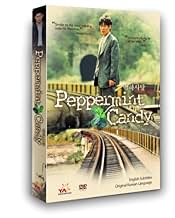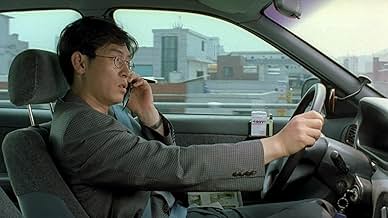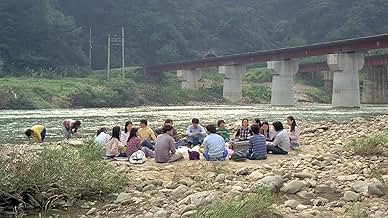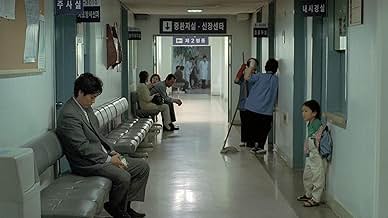VALUTAZIONE IMDb
7,6/10
11.706
LA TUA VALUTAZIONE
Dopo il suicidio di un uomo, il tempo torna indietro per rivelare sei capitoli della sua vita sul perché si è suicidato.Dopo il suicidio di un uomo, il tempo torna indietro per rivelare sei capitoli della sua vita sul perché si è suicidato.Dopo il suicidio di un uomo, il tempo torna indietro per rivelare sei capitoli della sua vita sul perché si è suicidato.
- Regia
- Sceneggiatura
- Star
- Premi
- 18 vittorie e 6 candidature totali
Ko Seo-hie
- Kyung-ah
- (as Seo-hie Ko)
Park Ji-yeon
- Female student
- (as Ji-Yeon Park)
Kim Kyeong-ik
- Myung-sik
- (as Kim Gyeong-ik)
Jeong Woo-hyeok
- Corporal Park
- (as Woo-hyeok Jeong)
Bae Jang-soo
- Camera shop owner
- (as Jang-soo Bae)
Recensioni in evidenza
A young man is drafted into South Korea's army, where he is forced to suppress student demonstrations. A stint in the police has him beating confessions out of suspects. Upon leaving the cop job, this wrecked, embittered soul fails as a businessman and a husband.
All of this is contrasted with the hero as a young and naive man who will never imagine what he will be made to become by a brutal, corrupt "system".
A very solid 8/10.
All of this is contrasted with the hero as a young and naive man who will never imagine what he will be made to become by a brutal, corrupt "system".
A very solid 8/10.
This is film art that makes no concessions to 'entertainment'. A man commits suicide at the start of the film. Then the filmmaker brilliantly flashes his life before us in short scenes moving backwards in time. The emotional power of each scene is built on our knowledge of what is yet to come for this corrupted and despairing man. And that power keeps intensifying, reaching an almost unbearable level of sadness and empathy. Not since Sophie's Choice have I seen a film so unflinching in its despair. Everything about this film demonstrates greatness: the screenplay, the cinematography, the performances, the wisdom and humanity. It's not an easy film and there were many walk-outs the night I saw it at the New Directors Festival in New York, but it will stand the test of time. Should be required viewing for every 18-year-old.
I was really impressed by the plot line of this film. I first wonder why he has to die and why he is so destructive. Then the plot goes reverse into the past while it untangles the mystery why he became that reckless. Chronologically placed scenes are bound together with one key 'peppermint candy'.
Kyung-gu Sol really plays the roll well. He plays it not just as a violent, but solitary and vulnerable man. Through his exquisite acting, we learn his character and even historical background. Without him, this film would be a husk.
Kyung-gu Sol really plays the roll well. He plays it not just as a violent, but solitary and vulnerable man. Through his exquisite acting, we learn his character and even historical background. Without him, this film would be a husk.
I saw this movie in a college class, and it's possible to have an entire lecture on it. Unfortunately, my professor only had about twenty minutes, though I'm sure he would've loved a couple hours.
Granted, the subtitles weren't the greatest. Being Korean, I had a much easier time understanding everything, because if there was something I couldn't quite understand in Korean, I had the subtitles to help me along.
To paraphrase my professor, this movie isn't just about the story of one man, but how this one man's life signifies the past fifty years of Korean history as well, a people subject to the influences of forces greater than they.
To give a quick Korean history lesson, for the first half of the century, the Koreans were brutally subjugated by the Japanese, who not only wanted to colonize it, but to assimilate the people and culture completely into their own. Then came WW2, and following that, the start of the Cold War conflicts, beginning of course with the Korean War, where brother fought brother and a people was torn apart.
The second half of the century, following the Korean War, has been defined by dictatorships, as the oppressive Korean government put down democratic student movements, as seen in part of the film. It is only recently that true democracy has begun to form and strengthen.
The main character of the movie is shown in the beginning, a ruined man, and one can assume from following sequences, shown in backwards chronological order, that he is an evil and corrupt man. However, the purpose of the movie is to show how he was corrupted by larger forces, mirroring the Korean people's own search for their lost innocence. It is in the seemingly mundane scenes of his life that we see how trite and ordinary violence and depravity have become, yet we also travel back to see where every part of him came from.
I'm sure I could say a lot more, but basically it's about a lot more than the story of one man, and the seemingly irrelevant stories of his life signify more about both him and the Korean people as a whole. Terrific movie.
Granted, the subtitles weren't the greatest. Being Korean, I had a much easier time understanding everything, because if there was something I couldn't quite understand in Korean, I had the subtitles to help me along.
To paraphrase my professor, this movie isn't just about the story of one man, but how this one man's life signifies the past fifty years of Korean history as well, a people subject to the influences of forces greater than they.
To give a quick Korean history lesson, for the first half of the century, the Koreans were brutally subjugated by the Japanese, who not only wanted to colonize it, but to assimilate the people and culture completely into their own. Then came WW2, and following that, the start of the Cold War conflicts, beginning of course with the Korean War, where brother fought brother and a people was torn apart.
The second half of the century, following the Korean War, has been defined by dictatorships, as the oppressive Korean government put down democratic student movements, as seen in part of the film. It is only recently that true democracy has begun to form and strengthen.
The main character of the movie is shown in the beginning, a ruined man, and one can assume from following sequences, shown in backwards chronological order, that he is an evil and corrupt man. However, the purpose of the movie is to show how he was corrupted by larger forces, mirroring the Korean people's own search for their lost innocence. It is in the seemingly mundane scenes of his life that we see how trite and ordinary violence and depravity have become, yet we also travel back to see where every part of him came from.
I'm sure I could say a lot more, but basically it's about a lot more than the story of one man, and the seemingly irrelevant stories of his life signify more about both him and the Korean people as a whole. Terrific movie.
If you manage to not be annoyed during its opening minutes that features a deranged asshole with suicidal tendencies putting up an extraordinary display of craziness before killing himself by getting run over by a train, you just might be able to enjoy Peppermint Candy and even end up being impressed by it too. Told in reverse chronology, this film covers the past 20 years in the life of that stupid maniac & depicts the events that eventually led to his suicide while also showing that he was not such a weirdo from the beginning but was slowly transformed into one by the Korean 'system'.
Nicely directed by Lee Chang-dong for the manner he has narrated this story, well-written too for how the events depicted in the life of the protagonist clash with relevant moments of Korean history, manically performed by its lead actor that also included few moments where he went completely over the top & was hamming like a freak, and displaying fine technical execution throughout its runtime, Peppermint Candy is a sad portrait of a young life wasted away by cynicism & loss of love that didn't really work as well as I would've liked & eventually felt much longer than its runtime.
Nicely directed by Lee Chang-dong for the manner he has narrated this story, well-written too for how the events depicted in the life of the protagonist clash with relevant moments of Korean history, manically performed by its lead actor that also included few moments where he went completely over the top & was hamming like a freak, and displaying fine technical execution throughout its runtime, Peppermint Candy is a sad portrait of a young life wasted away by cynicism & loss of love that didn't really work as well as I would've liked & eventually felt much longer than its runtime.
Lo sapevi?
- QuizSeo-hie Ko's debut.
- ConnessioniReferenced in Making Memories of Murder (2004)
- Colonne sonoreCatch the Rainbow
Written & Performed by Ritchie Blackmore and Ronnie James Dio
(Blackmore and Dio are member of Rainbow)
I più visti
Accedi per valutare e creare un elenco di titoli salvati per ottenere consigli personalizzati
- How long is Peppermint Candy?Powered by Alexa
Dettagli
Botteghino
- Lordo in tutto il mondo
- 89.184 USD
Contribuisci a questa pagina
Suggerisci una modifica o aggiungi i contenuti mancanti

Divario superiore
By what name was Peppermint Candy (1999) officially released in Canada in French?
Rispondi


























